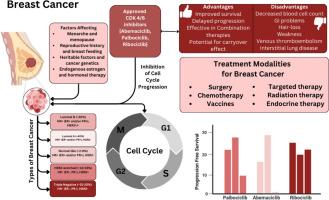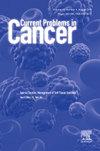Advances in breast cancer therapy: “Exploring the therapeutic potential of CDK 4/6 inhibitors and their clinical impact.”
IF 2.3
4区 医学
Q3 ONCOLOGY
引用次数: 0
Abstract
One of the most common malignancies diagnosed globally is breast cancer, a condition that is impacted by both environmental and genetic causes, there are three distinct molecular subtypes of breast cancer: hormone receptor-positive (HR+), HER2-positive (HER2+), and triple-negative (TNBC). About 70–75 % of instances of breast cancer are HR+, whereas 15–25 % of cases are HER2+ tumours, which can be successfully treated with targeted therapy. TNBC poses specific treatment problems and is linked to an increased risk of early recurrence because it lacks expression of ER, PR, and HER2. With the discovery of Inhibitors of cyclin-dependent kinases 4 and 6 (CDK4/6), such as ribociclib, palbociclib, and abemaciclib, the treatment of advanced HR+/HER2− breast cancer has shifted. These drugs are essential for arresting the cell cycle and limiting tumour growth. These inhibitors particularly target the cell cycle development from the G1 to the S phase, which is frequently dysregulated in breast cancer. CDK4/6 inhibitors' full potential is still being investigated, including the way they might be applied to various breast cancer subtypes and in conjunction with other treatments.
This review comprehensively examines the utilization strategies of CDK 4/6 inhibitors across various breast cancer subtypes, explores the mechanism of resistance, and highlights potential applications in combination with other treatments. Through a detailed analysis of clinical trials and real-world data, The review highlights how CDK4/6 inhibitors have revolutionized the treatment landscape for breast cancer, paving the way for optimized treatment outcomes.

乳腺癌治疗进展:“探索cdk4 /6抑制剂的治疗潜力及其临床影响。”
全球诊断出的最常见的恶性肿瘤之一是乳腺癌,这种疾病受环境和遗传原因的影响,乳腺癌有三种不同的分子亚型:激素受体阳性(HR+)、HER2阳性(HER2+)和三阴性(TNBC)。大约70 - 75%的乳腺癌病例是HER2+,而15 - 25%的病例是HER2+肿瘤,这可以通过靶向治疗成功治疗。TNBC具有特殊的治疗问题,并且由于缺乏ER、PR和HER2的表达,与早期复发的风险增加有关。随着周期蛋白依赖性激酶4和6 (CDK4/6)抑制剂的发现,如ribociclib、palbociclib和abemaciclib,晚期HR+/HER2−乳腺癌的治疗发生了变化。这些药物对阻止细胞周期和限制肿瘤生长至关重要。这些抑制剂特别针对从G1期到S期的细胞周期发育,这在乳腺癌中经常失调。CDK4/6抑制剂的全部潜力仍在研究中,包括它们可能应用于各种乳腺癌亚型的方式以及与其他治疗方法的结合。本文综述了cdk4 /6抑制剂在不同乳腺癌亚型中的应用策略,探讨了耐药机制,并强调了与其他治疗联合的潜在应用。通过对临床试验和真实世界数据的详细分析,该综述强调了CDK4/6抑制剂如何彻底改变了乳腺癌的治疗前景,为优化治疗结果铺平了道路。
本文章由计算机程序翻译,如有差异,请以英文原文为准。
求助全文
约1分钟内获得全文
求助全文
来源期刊

Current Problems in Cancer
医学-肿瘤学
CiteScore
5.10
自引率
0.00%
发文量
71
审稿时长
15 days
期刊介绍:
Current Problems in Cancer seeks to promote and disseminate innovative, transformative, and impactful data on patient-oriented cancer research and clinical care. Specifically, the journal''s scope is focused on reporting the results of well-designed cancer studies that influence/alter practice or identify new directions in clinical cancer research. These studies can include novel therapeutic approaches, new strategies for early diagnosis, cancer clinical trials, and supportive care, among others. Papers that focus solely on laboratory-based or basic science research are discouraged. The journal''s format also allows, on occasion, for a multi-faceted overview of a single topic via a curated selection of review articles, while also offering articles that present dynamic material that influences the oncology field.
 求助内容:
求助内容: 应助结果提醒方式:
应助结果提醒方式:


